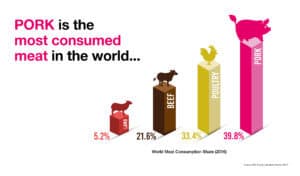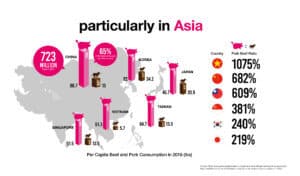David Yeung is the Founder & CEO of Right Treat, and also launched Green Monday, a social venture with the mission to tackle climate change, food insecurity and public health. His work in the field of sustainability and innovation has earned him the award of “Social Entrepreneur of the Year” by the World Economic Forum and Schwab Foundation. Other honors and recognitions include “Ten Outstanding Young Persons Hong Kong,” “50 Most Innovative Companies” and “Idea of the Year.”
Mr Yeung founded Right Treat, based in Hong Kong, which addresses the sustainability issues caused by the immense consumption of pork in Asia; an estimated 1.29 billion metric tonnes of waste is produced by the Chinese pork industry per year alone. Right Treat have labelled pork as “An Industry Overdue for Disruption” and aim to do so with their innovation. vegconomist spoke with Mr Yeung about Omnipork, sustainability, and the recent UN environmental awards which recognised his peers Beyond Meat and Impssible Foods.
Can you introduce OmniPork, what was the motivation behind your launch?
My motivation behind founding Green Monday, Green Common and now Omnipork is to shift the world towards a healthier and more sustainable food system. Given we are based in Asia, and given Asia has the highest population in the world, we channel our understanding of Asian meat consumption to a product innovation that is not yet available and has the potential to be a game-changer in our market. That innovation is called Omnipork.

When and where will Omnipork be available?
Omnipork is already available in Hong Kong at various hotels and restaurants. For example, the Chinese restaurants in Grand Hyatt, Royal Garden Hotel, Cordis Hotel already feature Omnipork in their signature dishes. Meanwhile, local names such as “Food Expression,” “King of Sheng Jian”, “Meat Pie Gor” are the ones that really relate to the Hong Kong locals. They are introducing exciting Omnipork dishes that cater to local palettes and immediately receive overwhelmingly positive feedback.
As for outside of Hong Kong, we are already working with restaurants in Singapore and Macau and the launch will come in November. Finally, fans in Hong Kong have been eagerly waiting for the retail pack for them to bring home and work their own culinary magic. That will launch in December in Hong Kong.
What differentiates Omnipork from other meat substitute products?
Omnipork is unique in terms of being an extremely versatile pork alternative innovation that works magic in Asian (and global) cuisines, with infinite applications. Asian chefs and households use pork in a very different way, pretty much as a base ingredient that can somehow be incorporated in every dish, rather than as a finished product such as pork cutlet, bacon, ham or sausage. Yet it is universally known that pork is high in fat, cholesterol and calories (not to mention antibiotics and hormone nowadays), so to have a plant-based alternative that is healthier but equally versatile is music to both chefs and consumers.

Relatively speaking, Western companies focus more on chicken and beef because that’s their main source of protein.
How much interest is currently shown in your product by restaurants and retail?
It has been overwhelming and extremely exciting. Asian chefs and households have been craving for innovations they can “play” with and apply their creativity and imagination.
Could you comment on the recent UN awards for Impossible and Beyond – what impact might this have on the cultured meat industry?
First of all, my heartfelt congratulations to Beyond Meat and Impossible Foods for the award. They are true pioneers and beacons that absolutely deserve the recognition. Yet on a macro level, the message doesn’t get louder or clearer than to have the highest, most credible authority in the world to come out and tell people that the meat industry and the food system is not sustainable and a shift in diet is essential to the fundamental survival of the planet and humanity. No question it will stimulate further much-needed shift in both supply and demand.
Your website says that 65% of meat consumed in China is pork. What kind of difference in terms of animal life and sustainability does your product have the potential to achieve?
Just in China alone we are talking about over 700 million pigs, and as we speak there is an African swine fever going on in multiple provinces in China, claiming away tens of thousands of hog lives. Meanwhile, the manure from the hog industry is one of the biggest source of water pollution. We can talk for hours just on this subject but there is no doubt the impact will be immense.
Which consumer group are you targeting? Is the primary focus the Asian market?
Asia has the world biggest population, and Asian food and meat industry is long overdue for innovation and disruption. People are also becoming much more food safety conscious and health conscious.
The meat industry has an enormous carbon footprint. How does the production of Omnipork compare to this?
Just like majority of plant-based innovations, Omnipork should have a massive improvement in terms of carbon footprint, water footprint, land use efficiency, and water pollution.

Are you planning to introduce more varieties, e.g. OmniBeef, OmniChicken?
Even just with pork alone, there are many more applications and possibilities that are not yet explored, and that’s what our team is focusing on right now.
Where do you see Right Treat in five years?
This doesn’t just apply to Right Treat. This applies to the entire plant-based industry. For the sake of the planet and humanity, these emerging brands can’t grow fast enough to become major players in the mainstream market. For Right Treat specifically, just penetrating the Asian markets is a tall task. Asia, despite its size, is highly fragmented. Each market has its own language, governance, regulations and cultures. So overcoming the barriers in each local market is by no means easy.





